- Home
- Megan Mccafferty
Perfect Fifths Page 11
Perfect Fifths Read online
Page 11
“Like the idea of rebuilding a place that most people had long written off as morally corrupt and hopeless, despite its gifts.”
“Uh … you know, I actually heard a little about your volunteer work from a friend. Paul Parlipiano. But I didn’t know how reliable the information was so …”
“Paul Parlipiano. Yeah, I remember him. We were on the same house-gutting crew. It was over a year ago, I think.”
“That sounds about right.”
“I had no idea of his name. I knew who he was through you, but I don’t know if I ever met him in person. He recognized me right away, which came as a surprise to me, considering I was elbow-deep in mold, wearing a biohazard suit and a respirator.”
“I’m not surprised. Paul’s, like, a savant with names and faces. There was one time when I was attending the Summer Pre-college Enrichment Curriculum in Artistic Learning, otherwise known as SPECIAL, remember?”
“Not really. Was that the same summer I was attending the Middle-bury In-Patient Adolescent Rehabilitation for Addictions and Associated Treatment Issues?”
“Otherwise known as?”
“MIPARAATI.”
“Mi para ti. Me for you.”
“Mi … para … ti … Me … for … you … You’re right.”
“Sí, señor. No one ever pointed that out before?”
“No. Never. Most experts would frown upon it as a rehabilitative philosophy. You’re supposed to clean up because you want to, not because anyone else wants you to. Mi para mi. But it definitely works as a personal philosophy, the idea of giving yourself over to others.”
[Pause.]
“How did we get on this subject?”
“We were talking about Paul Parlipiano, and I started telling you about the trip I took to the city when I was at SPECIAL.”
“Oh, right.”
“For the record, it wasn’t the same summer. You were in Middlebury the summer before.”
“Where was I during your SPECIAL summer?”
“I have no idea. Which was kind of the whole point of getting out of Pineville for six weeks.”
“Ah, yes. I see.”
“Anyway. I took a trip into the city, and I ended up standing next to Paul Parlipiano at this tiny coffee shop near the Columbia campus. He knew who I was right away, even though I hadn’t seen him in, like, two years. Then again, it’s probably hard to forget someone after she’s puked on your shoes.”
“You puked on Paul Parlipiano’s shoes?”
“I was sixteen years old and drunk. I’ve gotten much better at holding my liquor since then.”
“I hope so. You’ll be happy to hear that he didn’t mention the puking. He was like, ‘Oh, you’re Marcus Flutie, aren’t you? I graduated from Pineville High a few years ahead of you. I’m Jessica’s friend from Columbia.’ He seemed like a good guy. We only hung out briefly. We went to a bar later that night, but he left the city the next day.”
“Wait. What? You went to a bar?”
“Yes.”
“Where people, like, go to drink alcohol?”
“Yes. That’s what people usually do in bars.”
“You hate bars.”
“I hated bars when I was the only person not drinking in them.”
“You drink now?”
“Socially.”
“Socially?”
“And in moderation.”
“You drink now. Socially and in moderation. I can’t believe it. Since when? Oh my God, no. Don’t even say it. I know the answer already. Right around the same time you shaved off The Beard.”
“I won’t say it because you said it for me. But you’re right. And this time I didn’t bring it up.”
“You sort of did. By mentioning going to a bar with Paul Parlipiano, you knew I would ask about the drinking.”
“I didn’t know that for sure. I thought you might ask what we talked about.”
“Okay. I’ll play along. What did you and Paul Parlipiano talk about?”
“Drywall. Socialism. Deregulation as the root of all financial evil.”
“Sounds like Paul.”
“Brad Pitt. Protesting the Beijing Olympics. Bioremediation.”
“Same save-the-world Paul.”
“What heterosexuals can learn through homosexual experimentation.”
“Wha—? You’re not serious.”
“I am.”
“No!”
“Yes!”
“Marcus! Paul Parlipiano … hit on you?”
“He didn’t outright proposition me. But he did spend a disproportionate amount of time trying to convince me that the research against bisexuality—the idea that you’re either gay, straight, or lying—was all wrong. And you know Paul better than I do, so you’re aware that he’s a very persuasive debater.”
“My high school crush-to-end-all-crushes almost had man sex with my ex.”
“Almost?”
“Do you hear that sound? Do you? That is the sound of my heart exploding.”
“Almost?!”
“Well, you are drinking again. How am I to know whether or not you’ve gone back to indiscriminate sex and all your other vices?”
“Indiscriminate man sex was never one of my vices. And for the record, I have not gone back to indiscriminate female sex, or drugs, or whatever other vices you might be referring to. I’ve learned to enjoy a few drinks every now and then among friends. That’s it.”
“Is that, you know, healthy for someone with your history?”
“I was never addicted to drugs or alcohol. Tobacco, maybe, but I kicked that habit, too. There were plenty of students at Pineville High who were far more messed up than I ever was. But I was more conspicuous, for whatever reasons.”
“The same reasons that make you a conspicuous loiterer.”
“Right. So my flirtation with self-destruction was harder to ignore, I guess. And I didn’t do anything to dispel any myths that might have circulated around town. The less I said about myself, the easier it was for everyone else to spin their own fabulist versions of Marcus Flutie, which was fine by me. Anything to keep up the attention-getting poet-addict-manwhore mystique that was the primary conceit of my teen years.”
“Well, it sure worked.”
“Too well, Jessica. It worked all too well.”
[Pause.]
“I don’t think Paul was really into you.”
“You don’t? I’ll try not to be insulted.”
“If he was really into you, he wouldn’t have given up so easily. I’ll tell you who he’s really hot for: my mentor. Remember Samuel Mac-Dougall? The writer? To bring this conversation full circle, he was the one who taught the writing class at SPECIAL that took the trip to New York City where I met up with Paul Parlipiano at the coffee shop.”
“I just saw his latest book in the airport gift shop.”
“The Rainbow Parachute.”
“Right. If he’s selling in the airports and supermarkets, he must be doing okay for himself.”
“Paul has been smitten with Mac for years. They met at my graduation party a few years back, and Paul has been semi-stalking him ever since. I mean, Paul actually signed up for one of his creative writing seminars, which I couldn’t believe, because there is nothing creative about Paul in the least. My friend Dexy from college still refers to Paul as, like, the worst gay sidekick ever. So it was kind of funny to watch serious Paul turn into a giggly teenage girl. I mean, he was exactly like me at seventeen, when I was taking Mac’s summer writing program and got so obsessed and was all, like, got it bad, got it bad, got it bad … I’m hot for teacher! It’s really the first time I ever saw Paul act so irrationally, which was a refreshingly shallow change from Mr. Weight of the World.”
“Did anything ever happen between them?”
“Nope. Mac rebuffed Paul’s advances, citing that it was unethical and kind of shady for a teacher to have intimate relations with a student half his age.”
[Throat clearing.] “Unethical and kind of sha
dy. Of course.”
[Pause.]
“So that must have been strange, bumping into someone from Pineville in the Lower Ninth Ward.”
“Stranger things have happened, Jessica.”
“That’s true. Give me an example.”
“An example?”
“A strange-but-true story. I love strange-but-true stories.”
“An example of a strange-but-true story …”
“Come on, Marcus. There are so many to choose from.”
“Don’t rush me. Let’s see … all right. I’ve got one. Ready?”
“Hit me.”
“A Detroit man named Figlock was walking down the street. A baby fell out of a high window and landed right on top of him. Both survived. A year later, Figlock was walking down the same street. The same baby fell out of the same window and landed right on top of him. Both survived again.”
“Yawn. If his last name were Babycatcher, then I’d be amazed. And I’ve heard that one already, anyway.”
“An American woman was shopping in a used bookstore in Paris. She spotted a copy of her favorite book of short stories from her childhood—”
“Yeah, yeah. She opened it up to the front page and found her name written on the inside in her seven-year-old handwriting. Gimme something else. And don’t insult me with the JFK–Abraham Lincoln connection, or how the twenty-dollar bill predicted September eleventh.”
“I wouldn’t dream of insulting you, Jessica. Not on purpose, anyway, and not so early into this reunion.”
“Quit stalling. I’m still waiting to be amazed.”
“Why is it that we’ve all heard these same strange-but-true stories?”
“It’s like a form of religion, Marcus. The existence of unbelievable possibilities make us believe in the impossible.”
“Ha! And you’ve accused me of spouting pseudo-philosophical bumper-sticker wisdom!”
“That was painfully bad, wasn’t it? I’m sorry, it must be the pseudoephedrines talking … Or, uh, the Midol. I’m sorry.”
“Jessica!”
“What?”
“You don’t even realize you’re doing it.”
“Doing what?”
“Apologizing all the time.”
“I’m—Oops! I did, didn’t I?”
“For the rest of this conversation, I’m charging you a dollar every time you say ‘I’m sorry.’”
“A dollar? How much money do you think I have?”
“Then you better mind your tongue.”
“Mind your tongue?”
“Oh, man. Now, that sounds like a badly translated tattoo.”
[Pause.]
“That was a joke, Jessica. I was making a joke.”
[Pause.]
“I was just thinking that if you got ‘mind your tongue’ as a tattoo wrapped around your other arm, it could also be read as ‘tongue your mind.’”
“‘Tongue your mind.’ That’s certainly evocative. I can just picture someone licking a brain, can’t you?”
“I can. It’s gross—yet oddly …”
“Sensual.”
“Right.”
“More provocative than evocative.”
“Ow. Ow. Ow.”
“Another wave of cramps?”
“Oh yeah. It’s a menstrual tsunami in my uterus. Oh, I’m being totally gross, right? TMI! Ewwwwwww!”
“Not at all. The female reproductive cycle is a beautiful thing. A wonderful, miraculous—”
“Are you stalling, Marcus? Because I’m still waiting.”
“For what?”
“For your best strange-but-true story.”
“Oh, right. Hmm… How about this one? Seventy-year-old Finnish twins were hit by cars while riding their bicycles. Two separate accidents on the same road. They lay comatose in adjoining hospital rooms, then died seventeen minutes apart—exactly the same amount of time between their births.”
[Violent coughing fit.]
“Are you okay?”
[Still more coughing.]
“Your bullshit detector is whoop-whoop-whooping. You’re right, Jessica. You got me. I made up that last part about the seventeen minutes, but the rest is true.”
[Cough.] “No, that’s not it.”
“What? Are you okay? Did I say something wrong?”
“No. Just. This cold. And. Ow. These beautiful, wonderful, miraculous cramps.”
“Are you trying to get me to apologize so I have to pay you a dollar?”
“Oh, so it goes both ways?”
“Of course it does. That’s just fair play. So I’ll ask again. Did I say something wrong? Because I won’t apologize even if I did.”
“You didn’t say anything wrong.”
“Are you sure?”
“I’m sure.”
“You don’t seem too sure.”
“I’m sure. Uh. I was just trying to remember something.”
“What?”
“A quote Mac shared with me. ‘’Tis strange—but true; for truth is always strange.’”
“Point taken: The Finnish twins story was strange but true enough as it was, without embellishment. I won’t exaggerate the truth again.”
“And if that quotation sounded like a bumper sticker or a bad tattoo, don’t blame me.”
“Who’s to blame?”
“Lord Byron, I think.”
“Aha! Byron is the fall guy! The scapegoat! Jessica, for the rest of this conversation, let’s blame it on Byron.”
“Blame what on Byron?”
“All of it. Anything. Everything.”
“On Byron?”
“Yes, Byron.”
“Why Byron?”
“Because he’s the one to blame.”
“For what?”
“All of it. Anything. Everything.”
“I see. So Byron is the de facto asshole of assholes.”
“Now you’re getting it!”
“At least our nonsensical non sequiturs have literary roots.”
“Want to know why this conversation isn’t making any sense?”
“Let me guess. Byron.”
“Bingo.”
[Pause.]
“So, not to put, uh, you know, undue emphasis on this particular topic or anything …”
“Feel free to put due emphasis on whatever topic you want, Jessica.”
“Because I can always blame it on Byron.”
“Exactly.”
“So having a drink every now and then is part of the whole Buddhist middle-path approach to life, right?”
“I was never a Buddhist.”
“Right. Are you still a deist who studies—What was it again?”
“Vipassana meditation. And not really. After years of trying, I had to own up to the fact that I’m not really the meditation type. It’s too passive. I’ve come closer at finding inner peace through action. Doing something instead of trying to contemplate nothing. That’s part of what my work in the Gulf Coast is all about. We tear houses down to the studs so they can be built again. Paul and I talked about this—the benefit of manual labor is that you can see the results right away. You tear out a door frame with a crowbar, and it’s gone, you know? It’s real progress, not just theoretical.”
“It’s the very opposite of the navel-gazing philosophy major I mistook you for.”
“I wasn’t going to point that out.”
“That’s why I didn’t want to guess.”
“What’s why?”
“You know how I hate to be wrong …”
“Right.”
“I didn’t want to find out just how totally wrong I could be.”
“The next time you make a mistake? Byron.”
“Right, I’ll pin it all on Byron.”
“Things will go a lot more smoothly, Jessica, if you just blame Byron.”
three
(fair question)
“Oh! I’m vibrating! I mean, my phone. It’s vibrating. Where is my phone? I can never find my phone.”
&
nbsp; “Isn’t there a special pocket for your phone?”
“There are, like, thirty-six special pockets for my phone.”
“But if you put it in the same pocket every time, you’ll always know where it is. You need a system.”
“A system. Gee whiz, Marcus. I never thought of that. And—Oh! I’ve found it. It’s already stopped. Let’s see… Oh …”
“Who was it?”
“Just my sister.”
“Are you avoiding Bethany?”
“Not avoiding, per se, just not going out of my way to talk to her.”
“Is there something going on?”
“Oh, no. Well, not really. I know why she’s calling, and it’s not, like, an emergency situation or anything, so …”
“Why is she calling?”
“She’s just calling to wish me a happy b—bon voyage. It’s nothing. No big. Sister stuff. You know.”
“Not really. But, er, okay. How is Bethany, anyway?”
“Bethany is a happy divorcée.”
“She split with what’s-his-name?”
“G-Money And yes. Two years ago.”
“I can’t say I’m surprised. He was always a bit of a …”
“Douchenozzle?”
“Well, yeah.”
“The divorce is the best thing that’s ever happened to Bethany—and Marin, for that matter.”
“Marin! How is Marin?”
“Marin is awesome. And get ready, because this is going to freak you out.”
“I’m ready.”
“She’s turning eight in June.”
“Eight?”
“Eight!”
“Oh, man. I remember when she was born! How did that happen?”
“Life happened. You want to see her picture?”
“Yes.”
“Here it is.”
“Wow. She’s a little knockout, isn’t she?”
“She’s really, really smart, too. But you can’t really see that in the picture.”
“Hmmm.”
“What?”
“This is going to sound crazy, but I swear that I’ve seen this picture before.”
“You’ve probably seen it in the advertising for the Be You Tea Shoppe.”
“Advertising?”
“Oh yeah. Before the stock market tanked, Marin’s face moved a few hundred thousand units of Chamomile Lowlights hair extensions to the six-to-nine-year-old starter market.”
“That’s it! I walked past Marin’s picture hundreds of times. One of those Shoppes used to be up on Nassau Street. It was MILF HQ until it went out of business.”

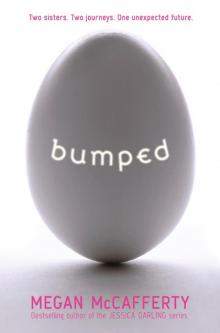 Bumped
Bumped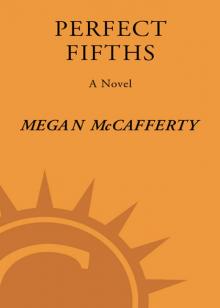 Perfect Fifths
Perfect Fifths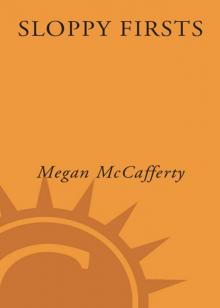 Sloppy Firsts
Sloppy Firsts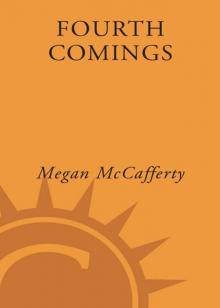 Fourth Comings
Fourth Comings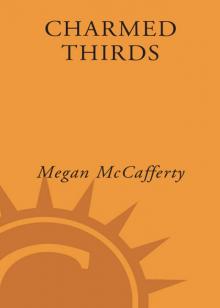 Charmed Thirds
Charmed Thirds Second Helpings
Second Helpings True to Your Selfie
True to Your Selfie Jessica Darling's It List
Jessica Darling's It List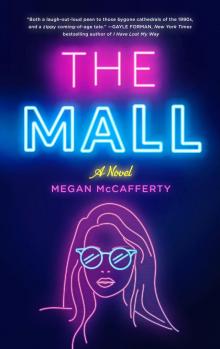 The Mall
The Mall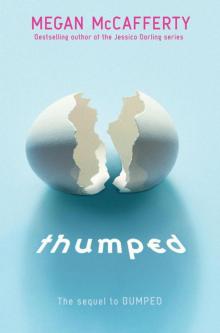 Thumped
Thumped Sixteen
Sixteen The (Totally Not) Guaranteed Guide to Friends, Foes & Faux Friends
The (Totally Not) Guaranteed Guide to Friends, Foes & Faux Friends The (Totally Not) Guaranteed Guide to Popularity, Prettiness & Perfection
The (Totally Not) Guaranteed Guide to Popularity, Prettiness & Perfection